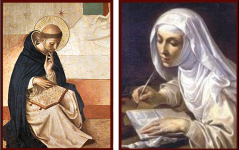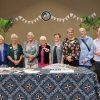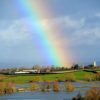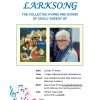 DOMINICAN LAITY
DOMINICAN LAITY
Newsletter #15
February 2011
Dear members of the New Zealand Dominican family
This newsletter is now in its 4th year. It started as a small way of keeping in touch with lay Dominicans around the country, and has grown. It is perhaps a sign of the importance of the Dominican way for an increasing number of lay people that at the pre-Chapter gathering in Dunedin in January, along with 38 of the sisters, there were 56 lay people. Some who attended had been also at the lay Dominican gathering in Wellington in May, but there were many others, including a welcome flavouring from non-Catholics. With a declining number of friars and sisters, it might have seemed as if the Dominican spirit in New Zealand was waning, but clearly Holy Spirit has other ideas – and they involve lay people.
Jenny and I were delighted to meet at the gathering, so many whom we had known previously as just names on a list. It was especially good to have a chance to talk with so many from the South Island. Our gratitude goes to the sisters who worked so hard (and successfully) to make the weekend run smoothly. And to the wonderful people at St Margaret’s, the university hostel – a welcoming and comfortable home away from home.
Ann Willits OP
It was a time to treasure, without doubt. The two presenters, Ann Willits and Matt Walsh, are truly blessed preachers. Their theme was: Contemplative Living, and a well chosen topic it proved to be. Few of us came away from those days unchanged in some way. Some of us may at times have wondered what is the better path for the Christian to take:
- the contemplative or the active
- the mystic or the missionary.
Sister Ann was emphatic: for the Dominican, it is not either/or – it is BOTH.
Both Sister Ann and Brother Matt spoke with wisdom, compassion and humour, and captured the hearts of everyone. Matt was probably not, as someone suggested, a bit like Gregory Peck – but he had a similar presence. And Ann was not quite Dawn French – but she had the same irreverent energy!
Ann told the most wonderful stories. One of them is in the latest copy of Tui Motu.
(Many thanks to Moira Gallagher, who diligently took notes of the sessions – she has made her notes available to us: see attached to this newsletter)
AUCKLAND: Kia ora allWe have a “Faith and Life” group that meets once a month. The group is seen as part of a Dominican family outreach but those who come are not necessarily linked to the Dominican family. If you are in Auckland feel free to ring Dorothy (826-5397) or me (817-6464). You will be most welcome.Susan
Talk on St Dominic and Dominican spirituality by Fr Peter Murnane.Last Tuesday fr. Peter talked to our “Faith and Life” group in New Lynn on St Dominic and Dominican spirituality. He touched on a number of themes. One was Dominic’s spirit of freedom that led to his being an initiator. This heritage is an important one he left to the Order. Also, Dominic was known as a man of great joy, while at the same time he had a deep compassion for people in their suffering. Dominic was a man of prayer and of community, and he had a deep sense of divine providence.Peter had gone to a lot of trouble to prepare his talk. He illustrated his points with stories and quotations from well known Dominicans from across the centuries. In the latter part of his presentation he talked a bit about himself and how the Dominican tradition had influenced his life and choices. Our group, which included a number of the Auckland members of our Dominican family, were most appreciative of the presentation and there were plenty of questions and points of discussion at the end.
( NB Fr Peter has promised to make a version of his talk available for this newsletter some time soon. Watch this space! — Ed.)
DUNEDIN LOOK! Two events coming up!
#1 A group to explore Dominican thought and spirituality is being formed in Dunedin. We are hoping to meet in April. If you are interested please contact Moira Gallagher Ph: (03)4774543 email: moirapgall@gmail.com.
#2Dominican Family Gathering
5th March 3pm
Kavanagh College, Dunedin
An invitation to all Dominican family members to celebrate the blessing of the recently installed St Dominic’s College history panels at Kavanagh College. This will be followed by a discussion about international Dominican life with Sr Fabiola from Rome and Sr Cecille from the Philippines. Please bring a plate for afternoon tea
INTERNATIONAL
New Zealand sister Jacqui Ryan has taken on a new, important role. The Dominican Leadership Conference of USA holds accreditation to the United Nations, particularly the UN Commission for Social Development. Jacqui has been invited to be part of the Dominican delegation. She is now in New York, and already has been attending meetings – last week, the NGO Committee concerning Indigenous Peoples Issues.
Jacqui will write an occasional report on her experiences at the United Nations and in USA. Here is her first.
A Reflection
Kia Ora! Greetings from your Aotearoa-New Zealand Dominican Sister.
The first major UN meeting for 2011 has been the Commission for Social Development, with its theme of Poverty Eradication. The well-being (human rights) of all peoples must lie at the heart of any agenda to eradicate poverty. As I sat and listened to presentations from Member States, UN organisations, International Panelists, and speakers at NGO-sponsored Side-Events, the term Social Protection Floor (SPF) was mentioned repeatedly. While the SPF holds specific meaning, in both economic and social policy terms, it generally includes the provision of basic services to ensure adequate access to: food, water, shelter, sanitation, health, education, decent work/employment, pensions, and where necessary cash transfers to ensure such services can be accessed by the very poor. While the SPF concept is not new to me (NZ is noted as a Welfare State), I was constantly reminded that such access is denied to billions of my fellow world citizens. At times, it was frustrating to hear ‘diplomatic speak’, especially in the knowledge that policy changes, if made at all, will be incrementally slow, depriving many more of their basic human rights. As the world develops, economically and technologically, social development must also rank highly on the political agendas of nation states, and the international institutions which underpin economic/fiscal policies/structures. The equitable access of all people to the basic necessities of life and well-being – their human rights, is fundamental.
It has been very encouraging to observe the efforts of the UN/NGOs as they commit themselves, severally and collectively, to focus on advocacy at the international level as a voice for the most vulnerable in our world. The Side-Events associated with the Commission were, in many ways, more interesting and ‘hands-on’ in content than the main sessions. Choosing which events to attend was difficult given the plethora of broad-ranging topics and the excellent guest speakers. One event I attended was sponsored by UNICEF, and titled: ‘Extreme Poverty and Violence Against Children’. The session included input, a film-clip, and panel discussion. It raised the issue of the 200+ million children around the world (excluding China) who are unregistered (i.e. without a birth certificate and therefore do not appear in official country statistics). Such children can be violated (often in multiple ways), trafficked, and at worst killed without trace. Governments and NGOs often find it difficult to strategise on child-centred plans/resources when such large numbers ‘go under the radar’. One speaker was emphatic: “Violence is not a theme; it is the reality of how people live!” And another commented: “There are over 1.8 billion experts on poverty – the poor themselves!” It seems clear to me that programs and actions must be rooted in human rights, otherwise violence, in its many forms, is likely to continue.
Other Side-Events which I attended included:
‘Social Dimensions of the New Partnership for Africa’s Development (NEPAD)’ – Department for Economic and Social Affairs (DESA);
‘Poverty, Rights and Access for those affected by or infected with HIV’ – NGO Committee on HIV/AIDS;
‘Poverty and Climate Change: Voices from Government, The Grassroots, and NGOs’ – Working Group on Poverty and Climate Change, NGO Committee on Poverty Eradication.
‘Promoting Social Integration: Voices from the Grassroots’ – NGO Committee for Social Development and UN Non-Governmental Liaison Services (NGLS).
Hopefully I have provided a flavour of these past 10 days. My deepest desire and prayer is that what has been spoken will be reflected in action – by individuals, NGOs and Member States. People are the world’s greatest resource and treasure, yet millions are destined to a life of abject poverty without our collective efforts.
I wish to conclude with a well-known Maori proverb which came to mind during the Commission sessions and Side-Events: Ui mai koe ki ahau he aha te mea nui o te ao, Māku e kī atu he tangata, he tangata, he tangata! Translation: Ask me what is the greatest thing in the world, I will reply: It is people, It is people, It is people!
Jacqui Ryan OP
Dominican Thought for the Week
Meister Eckhart says: “If a man were in an ecstasy, as Saint Paul was, and knew some sick man needed him to give him a bit of soup, I should think it far better if you would abandon your ecstasy out of love and show greater love in caring for the other in his need.” ‘Love’ – there it is, that small Gospel word, that harbinger of the grace of attention, that reminder to us all of what contemplation – Christian contemplation – really means!
Paul Murray OP, Preachers at Prayer, Dominican Publications 2003
TWO POEMS
DEVELOPMENT
A seed is planted
Grows into wheat
The grain is harvested
Ground into flour
Yeast is added
To make it rise
Salt is added
To give it flavour
Water is added
To stick it together
The bread is made
A baby is born
Of two parents
Grandparents add love
And further identity
Aunts and uncles pitch in
Their ideas and dreams
Teachers add another layer
Of skill and knowledge
Friends run along
Adding to the mix
An adult has arrived
An idea begins in the minds
Shared with another it grows
They work with others
To develop it further
The wisdom is forged in steel…
In laughter the edges are
Softened and smoothed
Time and place
Impart authenticity
A dream becomes real
Angela Coleman May 2010
DOING THE DISHES
(i)
After a meal – the dishes.
A chore.
Or something more?
When I’m on my own
The small pile of dishes
Emphasises my aloneness.
A meal needs to be shared.
Yet these very dishes
Have been used by others.
They recall other meals,
Experiences explored,
Joys celebrated,
Sorrows shared.
I’m no longer alone.
After a shared dinner,
And the companionable talk,
Things are said at the kitchen sink
Which are never said elsewhere.
When I choose to leave the dishes
Until guests have gone,
I can revisit the evening,
Recall the conversation, re-member the friendship.
This is the plate she used
When we shared that joke.
This is the glass he held
When he spoke of his job loss.
This is the dish which held the salad,
A variety of fruits
Like the variety of ourselves.
(ii)
Who did the dishes
After the meals Jesus shared?
What memories were revisited
As they cleaned and tidied?
How did they remember their guest,
Who had used this dish,
This plate,
This goblet?
Was Jesus there helping them tidy up,
Or would this be more
Than the culture could stand?
Did Peter’s mother-in-law wash up
After she served Jesus?
What did she remember?
What did she say?
What did she do?
Who cleaned up
And knew
There were twelve baskets of scraps?
What did they remember?
What did they say?
What did they do?
Who exchanged comments in the kitchen
After the woman anointed Jesus?
What did they remember,
What did they say?
What did they do?
When Jesus went to his death
Who cleaned up?
Who tidied the room?
Who did the dishes after the Last Supper? What did they remember?
What did they say?
What did they do?
Who did the dishes in the inn
In the town of Emmaus
After the breaking of the bread?
What did they remember?
What did they say?
What did they do?
Meals don’t end with the eating.
Eucharist doesn’t end
When we leave the table.
The daily chore,
With all its potential
For memory,
And saying,
And doing,
Follows and continues
The sharing of the daily bread.
“Do this in memory of me.”
Margaret Butler OP
FORMATION IN DOMINICAN LIFE AND SPIRITUALITY
At the lay Dominican gathering in May 2010, it was decided to explore how to make a process of formation for lay people. A start has been made on this. A group has been meeting in Wellington for some months, and groups are planned in Dunedin and in Auckland. We know there are interested people in other areas also.
If you would like to be a part of the exploration of formation, please contact us and we shall put you in touch with others in your area and make you part of a contact group for the purpose of discussing the process.
Mike Kelly and Jenny Wilson
Co-ordinators
Ph 06 370 2084 Email: kelly-wilson@ihug.co.nz








